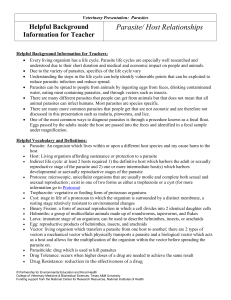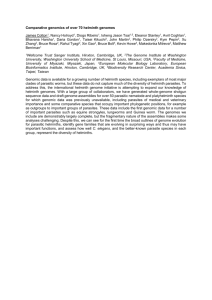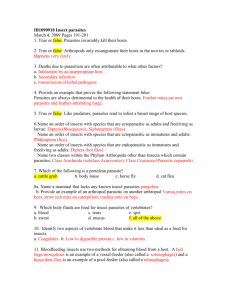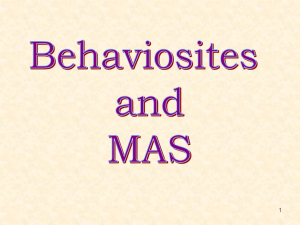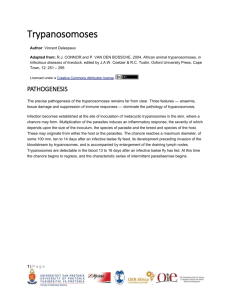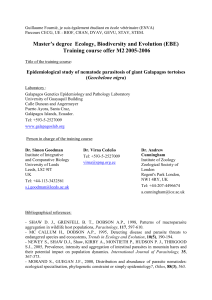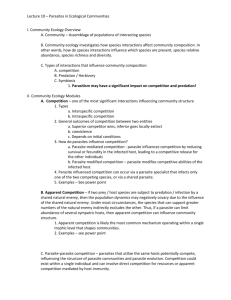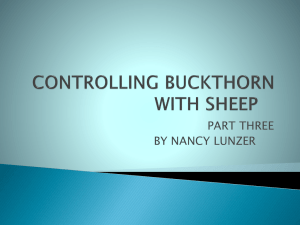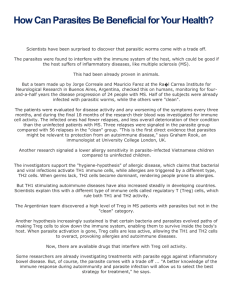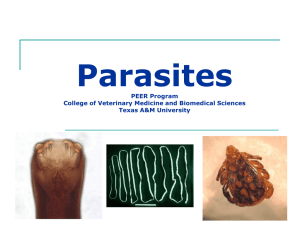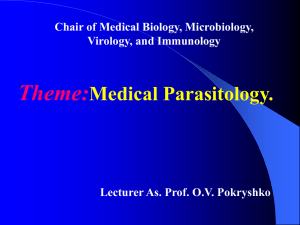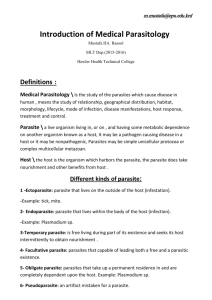Parasites and Parasitism (CAMB 549)
advertisement
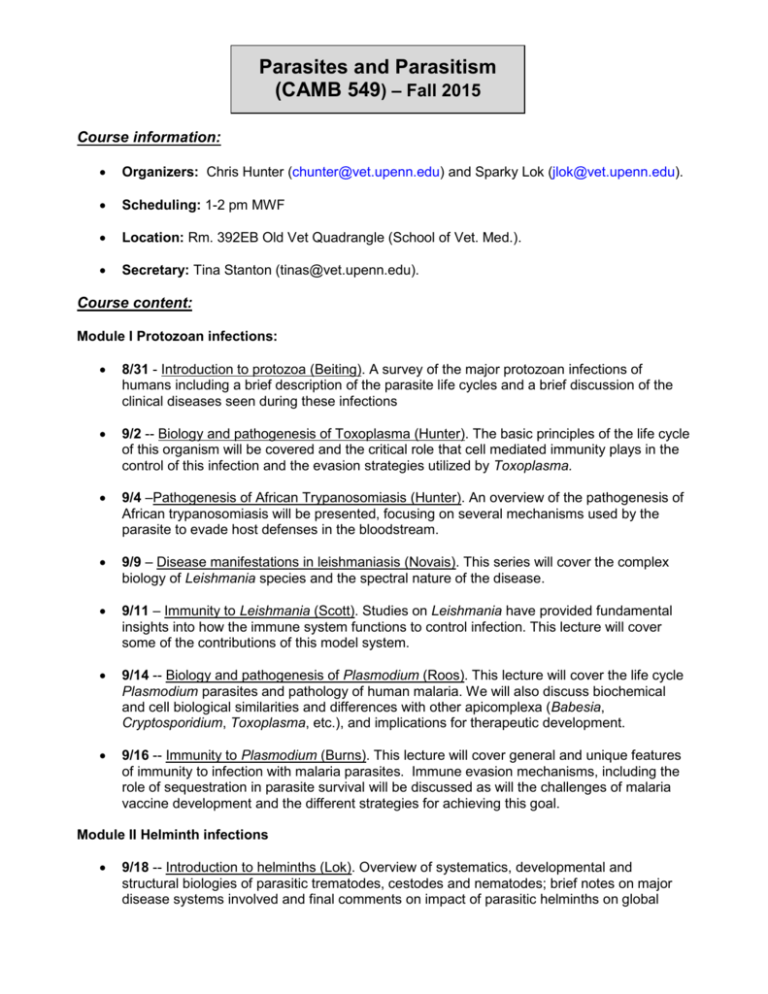
Parasites and Parasitism (CAMB 549) – Fall 2015 Course information: Organizers: Chris Hunter (chunter@vet.upenn.edu) and Sparky Lok (jlok@vet.upenn.edu). Scheduling: 1-2 pm MWF Location: Rm. 392EB Old Vet Quadrangle (School of Vet. Med.). Secretary: Tina Stanton (tinas@vet.upenn.edu). Course content: Module I Protozoan infections: 8/31 - Introduction to protozoa (Beiting). A survey of the major protozoan infections of humans including a brief description of the parasite life cycles and a brief discussion of the clinical diseases seen during these infections 9/2 -- Biology and pathogenesis of Toxoplasma (Hunter). The basic principles of the life cycle of this organism will be covered and the critical role that cell mediated immunity plays in the control of this infection and the evasion strategies utilized by Toxoplasma. 9/4 –Pathogenesis of African Trypanosomiasis (Hunter). An overview of the pathogenesis of African trypanosomiasis will be presented, focusing on several mechanisms used by the parasite to evade host defenses in the bloodstream. 9/9 – Disease manifestations in leishmaniasis (Novais). This series will cover the complex biology of Leishmania species and the spectral nature of the disease. 9/11 – Immunity to Leishmania (Scott). Studies on Leishmania have provided fundamental insights into how the immune system functions to control infection. This lecture will cover some of the contributions of this model system. 9/14 -- Biology and pathogenesis of Plasmodium (Roos). This lecture will cover the life cycle Plasmodium parasites and pathology of human malaria. We will also discuss biochemical and cell biological similarities and differences with other apicomplexa (Babesia, Cryptosporidium, Toxoplasma, etc.), and implications for therapeutic development. 9/16 -- Immunity to Plasmodium (Burns). This lecture will cover general and unique features of immunity to infection with malaria parasites. Immune evasion mechanisms, including the role of sequestration in parasite survival will be discussed as will the challenges of malaria vaccine development and the different strategies for achieving this goal. Module II Helminth infections 9/18 -- Introduction to helminths (Lok). Overview of systematics, developmental and structural biologies of parasitic trematodes, cestodes and nematodes; brief notes on major disease systems involved and final comments on impact of parasitic helminths on global disease burden. 9/21 -- Th2 responses during helminth infection: balancing host protection, immunopathology and control of coincident infections. (Abraham). 9/23 -- Helminth biology with a focus on Schistosoma (Beiting). This lecture will stress four aspects of schistosome biology and pathogenicity: (1) the life cycle, (2) molecular composition, structure and development of the tegument with notes on role of tegumental molecules in host-parasite interactions, (3) molecular genetics and the genome with emphasis on new functional genomic tools for schistosomes, and (4) the pathogenesis of schistosomiasis with emphasis on granuloma formation. 9/25 -- Innate immunity to helminth parasites: Role and interaction of granulocytes leading to direct killing of parasites and regulation of the innate immune responses. (Abraham). 9/28 -- Parasite modulation of host behavior (Greenberg). Parasites can alter host behavior, apparently to their advantage, but distinguishing between adaptive manipulation versus pathology can sometimes be tricky. We will examine some of the best-studied cases of apparent manipulation, with an eye towards understanding underlying molecular and physiological mechanisms. Module III Parasite Ecology & Evolution / Arthropod associated parasite transmission / Genome-scale studies of parasites 9/30 -- Ecology of Parasites (Levy). Covers the Ross-Macdonald model in the context of T. cruzi ecology and control. 10/2 – Evolution of virulence in parasites (Smith) General theory in the context of recent mass die-offs of Eider ducks infected with acanthocephalan parasites. 10/5 -- Helminth drug targets and drug discovery (Greenberg). In the absence of vaccines, chemotherapy represents the major strategy for treating and controlling helminth infections. However, lack of drug options and emergence of parasite drug resistance are huge problems, and new drugs are urgently needed. We will explore current anthelmintic drug targets, and prospects for development of new targets and new drugs. One obvious strategy for developing selective anthelmintics would be to target parasite-specific proteins and pathways. Surprisingly, however, most current anthelmintic drugs actually interact with proteins that are very highly conserved between mammals and helminths. We will explore those drugs and targets, as well as strategies for development of new therapeutics. 10/7 -- Parasite genomics (Harb). This session will focus on the use of the Eukaryotic Pathogens databases. This lecture will cover some parasite biology while at the same time considering how in silico experiments are done on these parasites, including high throughput methods and database incorporation. 10/9 – Introduction to Vector Biology (Lok). Overview of systematics, evolutionary and structural biology of arthropod vectors, with a breakdown of taxa involved in transmission of parasitic disease agents and an outline of general types of vector/parasite interaction. 10/12 -- Molecular Interactions of Parasites and Vectors (Povelones). Discussion of current papers on receptor/ligand interactions mediating parasite migration and proliferation in vectors and vector defensive responses limiting parasite growth; genetic manipulation of 2 vector/parasite interactions with an eye to novel control methods. 10/14 -- Plasmodium infections of wild-living primates and their zoonotic potential (Hahn). Ecology, population genetics and evolutionary biology of Plasmodium spp. in primates, with discussion of their relative importance in the origins of human malaria and in present-day zoonotic infection. Module IV Student presentations 10/16 -- Student presentations 10/19 -- Student presentations 10/21 -- Student presentations / Hand out take-home final exam 10/28 -- Final exams due Grading: Student presentations (presentation and critical discussion of current papers relevant to topics under discussion) are worth 40% of grade. Take home exam accounts for 60% of grade. 3
